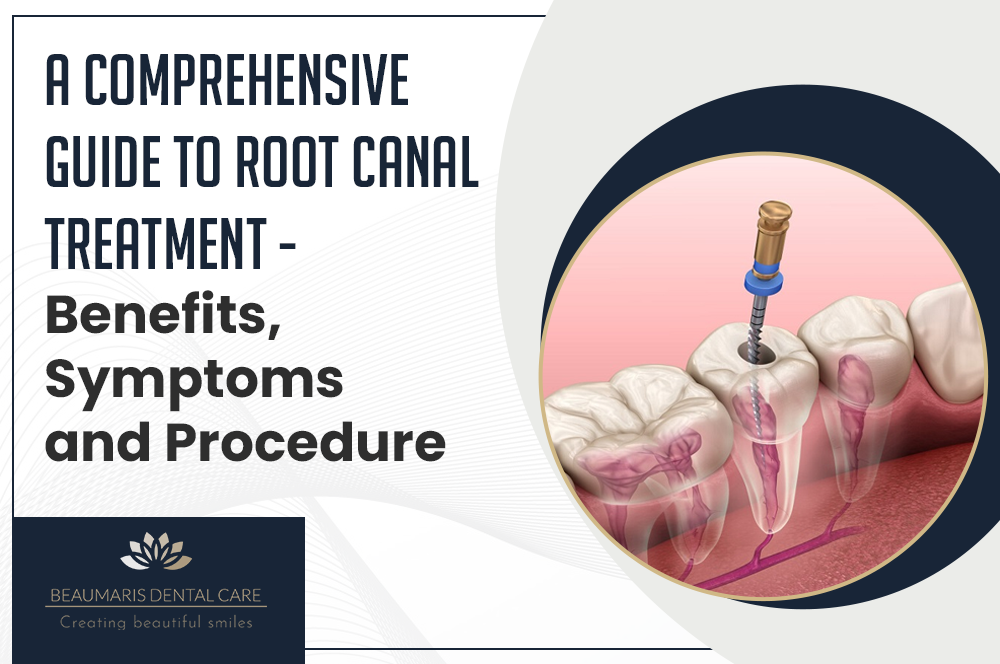A Comprehensive Guide to Root Canal Treatment - Benefits, Symptoms and Procedure
Often surrounded by myths and misconceptions, root canal treatment is a dental procedure crucial in preserving a damaged or infected tooth. Despite its reputation, understanding the process and benefits of root canal treatment is essential for those facing the prospect of this procedure. This comprehensive guide will delve into the intricacies of root canal treatment, exploring its purpose, procedure, and recovery.

-
When is Root Canal Treatment Necessary?
Root canal treatment becomes imperative when the pulp, the innermost part of the tooth, becomes infected or damaged. This can occur for various reasons, including untreated cavities, deep decay, cracked or fractured teeth, or repeated dental procedures on a particular tooth. When the pulp is compromised, the infection can spread, leading to severe pain, swelling, and potential abscess formation.
-
Signs and Symptoms of Root Canal:
Recognizing the signs and symptoms that may indicate the need for a root canal is crucial for seeking timely dental intervention. Common indicators include:
- Persistent Toothache: Unrelenting pain, especially during chewing or application of pressure.
- Discoloration: Darkening or discoloration of the tooth, indicating potential nerve damage.
- Swollen Gums: Inflammation and tenderness in the gums surrounding the affected tooth.
- Pimple on the Gums: The presence of a pimple-like bump on the gums, also known as a dental abscess
- Sensitivity: Heightened sensitivity to hot or cold temperatures.
-
The Root Canal Procedure:
Contrary to popular belief, a root canal procedure is not as daunting as it may seem. It is a routine dental treatment aimed at saving a tooth from extraction. Here is a step-by-step breakdown of the root canal process:
- Isolation and Rubber Dam Placement: A rubber dam is placed around the tooth during the procedure to keep it dry and saliva-free.
- Cleaning and Shaping: Specialized instruments remove the infected pulp, clean the root canals, and shape them for filling.
- Temporary Seal: A temporary seal is placed on the access opening, and the patient is scheduled for a follow-up visit.
- Diagnosis and X-rays: The dentist conducts a thorough examination, reviewing symptoms and taking X-rays to assess the extent of damage.
- Local Anesthesia: To ensure the patient’s comfort, the dentist administers local anesthesia to numb the affected tooth and surrounding area.
- Access Opening: The dentist creates a small opening in the tooth’s crown to access the infected or damaged pulp.
- Medication and Filling: The cleaned and shaped canals are filled with a biocompatible material, typically gutta-percha, to seal the space and prevent further infection.
-
Recovery and Aftercare:
Understanding what to expect during recovery is essential for a smooth post-treatment experience. Patients may experience mild discomfort or sensitivity, which can be alleviated with over-the-counter pain medications. Following any prescribed medications and maintaining good oral hygiene practices is crucial. Attending follow-up appointments is essential for the dentist to monitor the healing process and ensure the tooth’s long-term health.
-
What are the Benefits of Getting Root Canal Treatment?
The root canal procedure relieves pain and saves a damaged tooth. Here are some benefits of getting root canal treatment:
- Pain Relief: One of the primary reasons for undergoing a root canal is to alleviate severe tooth pain caused by pulp inflammation or infection. The procedure removes the damaged pulp, relieving the pain associated with the disease.
- Save Natural Tooth: Root canal treatment allows you to retain your natural tooth. Unlike extraction, which involves removing the entire tooth, a root canal preserves the tooth’s outer structure by removing only the infected or damaged pulp
- Functional Restoration: After a root canal, the tooth is typically restored with a crown or filling. This restoration helps maintain the tooth’s function in biting and chewing, preventing further deterioration of oral function.
- Prevent the Spread of Infection: Removing infected or damaged pulp during a root canal prevents the spread of infection to other parts of the mouth or body. This is crucial for maintaining overall oral health.
- Improved Oral Health: Root canal treatment improves oral health by eliminating infection and preserving the natural tooth. It prevents the need for extraction, which can lead to other oral health issues and complications.
- Efficient Chewing and Speaking: Restoring a tooth through root canal treatment allows for efficient chewing and speaking. This is important for maintaining regular eating habits and effective communication.
- Prevent Jaw Problems: Losing a tooth can lead to changes in bite and jaw alignment. By preserving the natural tooth through a root canal, you help prevent these potential issues, maintaining the overall stability of the jaw.
It’s important to note that the success of a root canal depends on proper follow-up care, including good oral hygiene practices and timely placement of a crown or filling to protect the treated tooth. Consulting with a dentist is essential to determine the best course of action for your specific dental condition.
-
The Importance of Timely Intervention:
Delaying or avoiding root canal treatment can have serious consequences, including the spread of infection, abscess formation, and the eventual loss of the tooth. Timely intervention not only preserves the natural tooth but also prevents the need for more invasive and costly procedures in the future.
-
Conclusion:
Root canal treatment, often misunderstood and feared, is a dental procedure designed to save teeth and alleviate pain caused by infection or damage to the pulp. Individuals can approach root canal treatment more confidently by understanding the process, recognizing the signs that may necessitate intervention, and debunking common myths. It is essential to prioritize oral health, seek timely dental care, and collaborate with dental professionals to ensure the longevity of one’s natural teeth.
Discover exceptional Root Canal Treatment at Beaumaris Dental Care in Brampton, where our commitment to your dental health sets us apart. Our experienced team of dental professionals prioritizes your comfort and well-being, employing advanced techniques and cutting-edge technology for effective root canal therapy. At Beaumaris Dental Care, we create a welcoming and relaxed environment to ensure your experience is stress-free. Our personalized approach to care means that your needs are at the forefront of our treatments.
Choose Beaumaris Dental Care for Root Canal Treatment in Brampton and experience the difference in our dedication to providing high-quality, patient-centered dental care.
Recent Posts
- Urgency and Care: Navigating Dental Emergencies with Beaumaris Dental Care in Brampton
- Smile Bright with Beaumaris Dental Care: Your Trusted Dentists in Brampton
- A Comprehensive Guide to Root Canal Treatment – Benefits, Symptoms and Procedure
- Unlocking the Secrets of Dental Cleaning at Beaumaris Dental Care: A Gateway to Oral Health
- The Ultimate Guide to Professional Teeth Whitening Services


